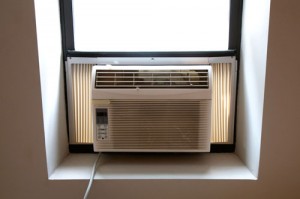Alternatives to conventional, energy-hogging air conditioners
Alternatives to conventional, energy-hogging air conditioners

The chlorofluorocarbon coolant widely used in air conditioners through the 1980s was phased out because it was damaging the Earth’s protective ozone layer, but the chemicals that replaced it are some 2,100 times stronger as greenhouse gases than carbon dioxide. We may have saved the ozone layer, but -- whoops! -- there goes the climate. Credit: Photos.com
Dear EarthTalk: Has an alternative to air conditioning to keep rooms cool been invented that is significantly cheaper and/or that uses significantly less energy than traditional air conditioning?–Ashutosh Saxena, Allahabad, India
Unfortunately the modern day air conditioner, with its constantly cycling, energy-hogging compressor and environmentally unfriendly chemical coolant, still reigns supreme throughout the world—and increasingly so in rapidly developing countries like India and China where possession of air conditioning connotes middle class status. And while the chlorofluorocarbon coolant widely used in air conditioners through the 1980s was phased out because its emissions were causing damage to the globe’s protective ozone layer, the chemicals that replaced it worldwide, and which are now in use in hundreds of millions of air conditioners, are some 2,100 times stronger as greenhouse gases than carbon dioxide. We may have saved the ozone layer, but—whoops!—there goes the climate.
Just because people aren’t using them much doesn’t mean there aren’t some good alternatives. The best known is an evaporative cooler (AKA swamp cooler). Better for hot, dry climates, these electrified units cool outdoor air through evaporation and then blow it inside. They make for a nice alternative to traditional air conditioners, using about a quarter of the energy overall. They are also quicker and cheaper to install, and can be moved around to different rooms as needed. But swamp coolers can require a lot of maintenance and may not keep the interior space as cool as some AC-hungry inhabitants might like.
Apartment/condo and commercial/industrial buildings might consider augmenting their existing roof-top air conditioning systems with the cooling power of ice. California-based Ice Energy makes and sells the Ice Bear system, essentially a large thermal storage tank that makes ice at night—when the cost and demand for energy is lower—and then doles out ice water into the air conditioning system during the day to efficiently deliver cooling when it’s needed. Since the air conditioner’s energy-intensive compressor can remain off during peak daytime hours, the electricity required for cooling can be minimal, with some customers achieving 95 percent electricity savings using the system. And utilities across the country are starting to encourage its use by large customers.
Stanford University has been utilizing its own version of similar technology since 1999 to keep its campus buildings cool. Since upgrading to an ice-based cooling system, Stanford saves some $500,000 a year on its campus cooling bill. If such technology could be adapted to augment home air conditioning systems, it could go a long way toward reducing air conditioning’s environmental footprint overall.
Of course, let’s not forget that a small investment in a fan or two to create a breeze or wind tunnel through inhabited interior spaces can go a long way to offset summer heat. Even better, get a professional to install a “whole-house fan,” which draws in cooler air through lower level open windows and exhales hotter air through specially designed attic vents synced to open when the system is operating.
The race has been on in the air conditioning business for some time to find a coolant that doesn’t destroy the ozone or add to global warming, but progress has been slow. Meanwhile, global warming itself will beget the need for more air conditioning, which will only exacerbate an already dire situation, especially as the rest of the world starts to demand artificial cooling just like we’ve enjoyed in the West for decades.
CONTACT: Ice Energy, www.ice-energy.com.
EarthTalk® is written and edited by Roddy Scheer and Doug Moss and is a registered trademark of E – The Environmental Magazine (www.emagazine.com). Send questions to: earthtalk@emagazine.com. Subscribe: www.emagazine.com/subscribe. Free Trial Issue: www.emagazine.com/trial.
Comments (0)